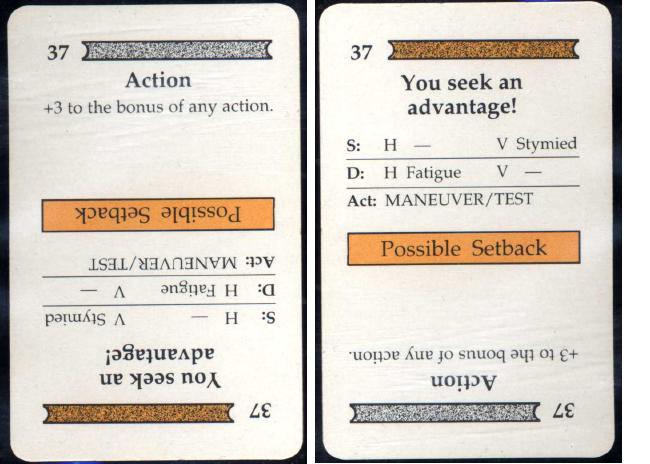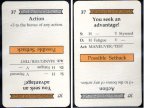I'll tackle
TORG.
First, let's look at the basic mechanics. Each character has seven ability scores: Strength, Dexterity, Toughness, Mind, Perception, Charisma, and Spirit. For a human, Joe Average has 8 in all these, and the normal maximum is 13. For PCs, the average is about 9.5 (66 points spread across the seven stats).
In addition to the ability scores, characters have skills. A starting PC has 16 points ("adds") to spend on his skills, with no more than three points to any one of them. One of the skills is called a "tag skill", which is the character's specialty. This skill has to be assigned 3 "adds." The total skill value is equal to the skill's governing stat plus the skill adds for that skill. So a starting barbarian warrior might have DEX 10 and 3 adds in Melee Combat, for a total Melee Combat value of 13.
So far there's nothing special. But now we take a look at task resolution. This is handled by rolling a d20, looking up the result on a small table that's printed on your character sheet, getting a "bonus number", and adding that number to your skill value. You then compare the total to a difficulty to see if you succeed. The system also allows for different levels of success, depending on how much you succeed by. The bonus number can range from -12 to infinity. Infinity, you say? Well, it's an open-ended roll. If you roll 10 or 20 on the d20, you roll and add another. You also have a number of Possibilities, that serve double duty as XP and action points. If you spend a possibility on an action, you get to roll an additional d20 and add to the first, with a minimum of +10.

One big innovation featured in the TORG game is the Drama Deck. Basically, you have a hand of cards that you can play in order to influence certain things in the game. Some of these cards are pretty straight-forward (e.g. "+3 to one action total", "+3 to Strength, Dexterity or Toughness for one round"), others are a little bit more esoteric ("Retry a failed roll", "Get one extra action", "Opponent fails"), some manipulate the card system itself ("Pick up the card on top of the discard pile", "Give your cards to the other players and refill your hand"), and some are subplots ("One of the NPCs is your arch enemy", "You get a romantic interest in one of the NPCs", "You are mistaken for someone you're not.") This last category also gets you some more XP, because you make things more interesting. The Drama Deck also serves double duty to determine the flow of combat.

As you can see, the cards have different stuff on the ends. The initiative is determined by the stuff on the right card, where it says:
S: H -- V Stymied
D: H Fatigue V --
This means: If the combat is "Standard" (basically, a fight that's not meant to be really dangerous, mostly a bunch of mooks), the heroes win initiative and the villains are stymied (meaning they don't get rerolls). If the combat is "Dramatic" (important fight, usually against the main villain or some important henchmen), the heroes win initiative but are fatigued.
Next, you see where it says "Act: Maneuver/Test". Those are the "approved actions" for the round: if you perform a Maneuver or Test of Wills against an opponent and succeed, you get to draw a new card. This is to reward players for doing something other than just shooting/beating their opponents up - however, it should not be overdone, in many cases attacking is the best option (and sometimes Attack comes up as the approved action for the round as well).
Finally, there's the bit that says "Possible Setback". This is part of the Dramatic Skill Resolution system. In some cases, solving a problem isn't as easy as just rolling a skill check. Think of a James Bond movie, where Our Hero has to disarm a bomb. This usually involves several steps, like opening the thing up, figuring up what goes where, dismantling the anti-tampering systems, and finally disarming the bomb itself. Each of these steps is assigned a letter: A, B, C, or D. These have to be performed in order, and the relevant letter has to appear on the initiative card for that round in order to perform the action. Usually, there's also some sort of time limit involved. This particular card is a little nasty however, because instead of a letter (or several), it says "Possible Setback." That means that unless you succeed in the appropriate roll, you
backslide along the path to success.
Then we come to the built-in setting. TORG is set on Earth, but an Earth that has been invaded by other realities, which bring their own laws of nature with them. In Indonesia, Victorian horror holds sway. In France, there's the Cyberpapacy - think of the worst excesses of the Catholic church, add miracles that actually work, as well as cybertech. Britain and Scandinavia are largely under the influence of Aysle, a fantasy realm. The US along the coasts is covered by the Living Land, a vast pre-historic jungle with powerful spiritual forces. Northeast Africa, focusing on Egypt, is ruled by the New Empire of the Nile - think pulps like Indiana Jones and the Shadow, with an additional touch of Egypt-flavored magic and miracles. Finally, Japan seems to have become more sinister and hi-tech lately, due to the hidden influence of the realm of Nippon Tech.
So, you wonder, why wouldn't you just use the biggest laser gun you can get from the Cyberpapacy, and load up with magic from Aysle and miracles from the Living Land? Well, because things that are too advanced for the user, or for the place they're used in, tend to mess things up. Each character has a "home reality", to which he has a metaphysical connection. It is this connection that allows him to momentarily break the rules of the reality he's in. However, when he does that there's a chance that the reality he's in will take notice, and break his connection to his home reality. Fortunately, PCs are among the few people who are capable of reforging this connection - the difficulty of doing so depending on the differences between the local reality and his home reality.
Well, I guess that's TORG in a nutshell.




